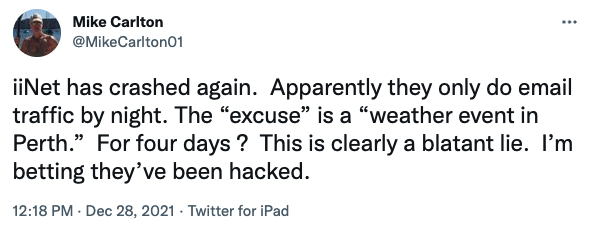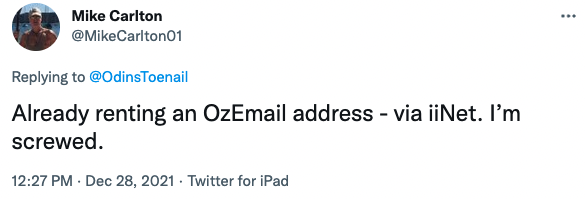
What was the first email address you ever had? For a lot of people under 40, they’ll have fond recollections of their first accounts being something along the lines of “xx_babi_gur69lxx@hotmail.com”. Maybe a @yahoo.com for something different. It would have been a free inbox with almost no space, you’d have to delete emails constantly to make room and maybe you’d check it once every few days.
Alternatively, if you were older and in charge of setting up your family’s home internet, you might remember your first email address as being one gifted to you as part of your ISP package.
Australian ones might be familiar old friends – @bigpond.com, @ihug.com.au, and infamously, @onetel.com.au. Malcolm Turnbull no doubt would have had his very own @ozemail.com.au.
These days, using these emails are few and far in between because the minute you want to switch internet service providers, it’s much harder to take that email address with you – so settling on an email service that you can access from anywhere and you can take with you is the key. And hey, you might not want your whole name on it either.
The dwindling of the public popularity of ISP email addresses have seen them become a weird relic of online times gone by, often a signal of a much older person reluctant to change.
Over Christmas 2021, Perth experienced an unprecedented heatwave. Heatwaves are an enormously dangerous event, however, this particular event had an unexpected casualty: the email servers for the internet service provider, iiNet.
Okay, not so unexpected — the same data centre went down due to a similar heatwave in 2015.
All other services operated as normal, but if you were one of the lucky few who, for whatever reason, had an @iinet.com.au email address, for about a week you were shit out of luck.
I mean, you couldn’t imagine that very many people would be complaining, would you? In 2021, who’s using an ISP email address?



But if that’s a boomer email address, what’s a non-boomer email address, and why is it better?
Let’s rewind back to 2004 — the time when Gmail first arrived on the scene. It was strictly invite-only, and with a whole luxurious 1GB in free space offered to begin with, we were enticed with the prospect of never deleting another message.
Millennials got a do-over, earmarking this moment as getting their Grown-Up Email that they could put on resumes, and not the embarrassing Hotmail pseudonymous addresses of yore. We seemingly never thought about email, or email addresses, again (except for maybe the new perpetual complaint that the emails never stopped, so much so that entire psychological strategies to get through your emails sprang forth).
It struck me as I read Mike’s insistence that he could never move from his Ozemail address because of everything attached to it — contacts, government services, banking — as far as accessing anything on the internet securely, your email address is more often as important as your phone number.
Often it’s exactly equal to it, with your email address and phone number being two key options of multi-factor authentication keeping your most important accounts secure when just a password won’t do.
There’s a problem here though — a phone number is still transferable between telecom service providers without change. A web-hosted email address isn’t. You can have your own domains with different servers, but that’s a whole other kettle of fish.
one of the craziest parts of hollywood is learning that most celebrity’s email addresses are like, cateblanchett @ gmail . com
— Johnny LaZebnik (@jlazebnik) March 21, 2022
Google is “free”, but we’re also all aware of exactly what that means from the company that used to have “Don’t be evil” in its code of conduct. Mark Zuckerberg‘s Meta is constantly in trouble for either buying out or outright plagiarising other services to make it impossible to leave where there are no good alternatives, even when the large proportion of its users don’t actually like using it.
And for what it’s worth — it doesn’t appear that anyone actually likes using Gmail as a preference. It’s just the “default” — in a way that every tech startup absolutely salivates to be. It’s too much work to look at anything different, so why would I?
Are those of us locked into Gmail addresses for nearly 18 years really any better or worse than poor Mike? Are we simply time-shifted boomers, insistent that we’re one and done? What happens to Gmail users when something happens to Google or is it simply too big to fail?
For what it’s worth — I have started trying to move away from the Gmail environment for two reasons:
1) I’m very contrary and don’t like the idea that we just have to lump it just because it’s hard to do something different.
2) I really hate Google.
Dear God, it’s hard to do. I opened a Protonmail account for personal and professional emails, but there’s an entire admin universe of what to filter, setting up calendars, changing over my bank emails and oh shit I forgot about MyGov. Where does it end?
I just realised I sound like Mike. Sorry for making fun of you earlier Mike, you’re absolutely right.* This sucks!
Before I wrote this article, I did ask around to see whether it wasn’t just me. I was curious to see, even from a small sample set, whether I was the only one who had stuck it out over the years, or whether others had moved on.
Overwhelmingly, I got replies back from people with similar experiences to any other millennial and me — trying to have a “grown-up” Gmail address, never bothering to change it. One friend told me they kept theirs because “why let go of a good thing?”
I guess we can look forward to the Zoomer tech support of the future complaining about millennials yelling at them from Gmail accounts.
*But not about the hacking thing though.
Evie is an internet anthropologist with a special interest in digital rights and our too-online lives. You can listen to her talk about current affairs with a feminist perspective at @3CRTueBrekkie or broadcasting from the burning edge of the climate crisis at @notgoodpod.
The post Just Gonna Say It: If You Have A Gmail Address You’re More Boomer Than You Thought appeared first on PEDESTRIAN.TV .







